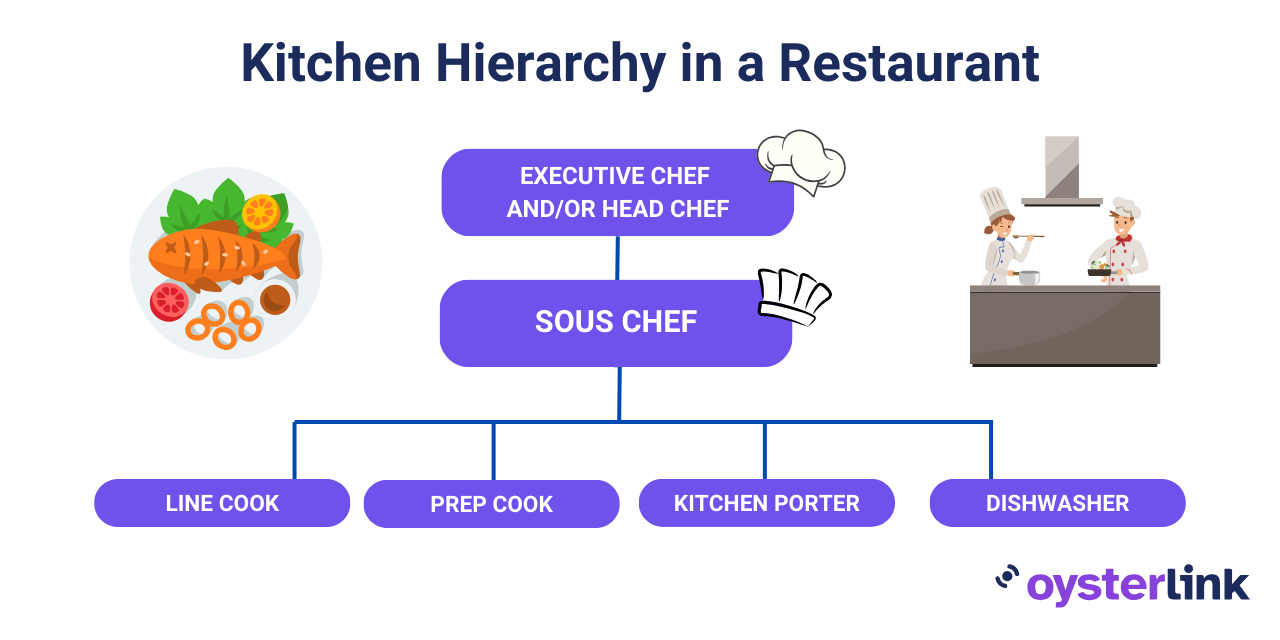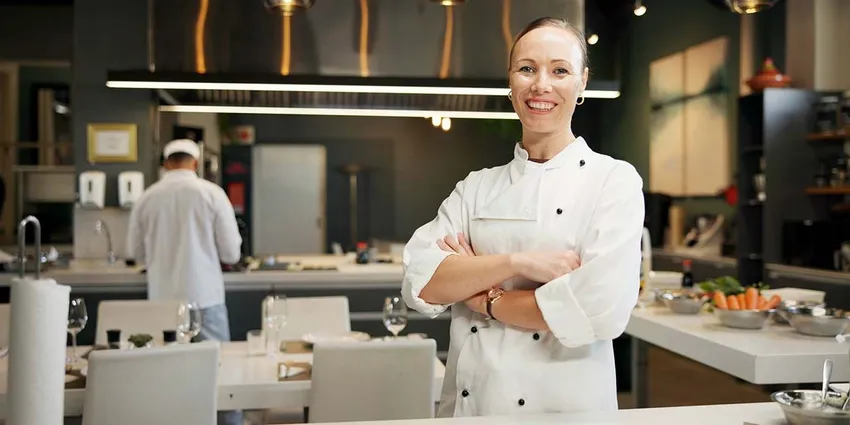So, what specific Sous Chef skills do you need to excel in this demanding role? This article will explain the key competencies required to successfully navigate the kitchen hierarchy and drive culinary excellence.
What Are the Essential Sous Chef Skills?
A successful Sous Chef is more than just a skilled professional Cook. In this section, we will outline the unique skill set and qualities that set top-tier Sous Chefs apart from the others.
1. Culinary Expertise
More than their excellent cooking skills, Sous Chefs should have a high level of culinary expertise. Here's a quick breakdown their important qualities:
- An understanding of various cuisines and their characteristic flavors
- Extensive knowledge of different ingredients, their flavors and how to use these effectively
- Mastery of various cooking methods (e.g., grilling, roasting, sautéing and braising)
- Ability to balance and enhance flavors in dishes
Overall, a Sous Chef's ability to consistently create and execute a wide range of dishes is crucial for upholding culinary excellence.
2. Menu Development
Menu development is the culinary process of conceptualizing, testing and perfecting dishes for a restaurant's menu.
As a key collaborator, the Sous Chef works closely with the Executive or Head Chef to create innovative recipes using seasonal ingredients. These creations must align with the restaurant's culinary identity and profitability goals.
These are the factors that go into menu development:
- Analyzing trends: Keeping up with global food trends by monitoring industry insights, food publications and even social media
- Seasonality and sustainability: Embracing sustainable practices by focusing on seasonal and locally sourced ingredients.
- Cost management: Maximizing profitability by carefully managing food costs and implementing effective pricing strategies
- Customer feedback: Actively seeking and incorporating guest feedback on the menu to identify areas for improvement and ensure customer satisfaction
3. Food Preparation
How is food preparation different from menu development, you ask? The latter is about creating unique recipes, while food preparation is the actual transformation of raw ingredients into the dishes.
A Sous Chef is instrumental in this process, as they oversee the creation of high-quality, consistently flavored and visually appealing dishes. Supervising food preparation means ensuring:
- Precise measurements of ingredients
- Usage of proper techniques
- Efficient portion control in the dishes
Sous Chefs are also tasked to train every team member involved in food preparation. That way, the entire kitchen staff can do their part in upholding the establishment's culinary standards.
4. Food Handling and Safety
Upholding stringent food handling and safety protocols within a kitchen is also part of the Sous Chef's responsibilities.
As the kitchen's number-two guy, they must ensure that all food preparation and service adhere to local health and safety regulations.
This includes overseeing the proper storage, handling and preparation of ingredients to prevent foodborne illnesses. This helps protect public health and ensure food safety.
5. Creativity and Innovation
A successful sous chef must possess a high degree of creativity and innovation. This involves experimenting with new culinary techniques, flavor combinations and presentation styles to keep the menu exciting and appealing.
By staying abreast of culinary trends and continuously seeking inspiration, a Sous Chef can contribute to menu development that delights patrons and sets the establishment apart from competitors. Embracing creativity not only enhances the dining experience but also fosters personal growth and satisfaction in the culinary arts.
6. Kitchen Leadership
A Sous Chef's leadership role involves guiding, coordinating and inspiring the kitchen team to achieve culinary excellence. It's about maintaining excellent food quality and food presentation standards while optimizing kitchen efficiency.
Sous Chefs help establish and maintain kitchen standards. They also cultivate a supportive team environment where staff feel empowered to contribute to the restaurant's success. This ability is crucial, especially when the higher-level chefs are not present during the shift.
In addition to effective communication, a Sous Chef should excel in conflict resolution and team motivation. The ability to address and resolve disputes amicably ensures a harmonious kitchen environment.
Moreover, inspiring and motivating the kitchen staff fosters a culture of collaboration and continuous improvement, leading to higher efficiency and job satisfaction among team members.
7. Organization and Time Management
Organization and time management are also essential Sous Chef skills because these are the foundations of efficient kitchen operations.
That said, a good Sous Chef excels in juggling multiple tasks, prioritizing efficiently and creating seamless workflows.
They effectively manage time and resources to make sure the kitchen operates smoothly, and the dishes are delivered promptly.
8. Financial Acumen
A proficient Sous Chef should possess a solid understanding of kitchen finances, including budgeting, cost control and profitability. This knowledge is crucial for contributing to menu pricing strategies, managing food costs and ensuring the financial health of the kitchen operations. By monitoring expenses and optimizing resource utilization, a Sous Chef can help maintain the establishment's profitability while delivering high-quality dishes.
9. Customer Service
Even though they work behind the scenes, Sous Chefs also significantly contribute to a restaurant's customer service. Here are some ways they contribute:
- Food quality and consistency: By maintaining consistent high-quality food, they ensure that every dish that leaves the kitchen meets the restaurant's standards.
- Efficiency and speed: A well-organized kitchen, supervised by a skilled Sous Chef, translates to faster service times — which directly impacts customer satisfaction.
- Problem-solving abilities: Issues with orders or food allergies can arise. A Sous Chef's ability to think on their feet and find solutions helps prevent customer dissatisfaction.
10. Organizational Skills
Effective inventory management is a critical component of a Sous Chef's organizational responsibilities. Keeping accurate records of stock levels, forecasting ingredient needs and minimizing waste through efficient stock rotation are essential practices. Implementing systematic inventory procedures ensures that the kitchen operates smoothly and reduces unnecessary expenditures.
11. Adaptability and Stress Management
The dynamic environment of a professional kitchen requires a Sous Chef to be adaptable and proficient in stress management. Unexpected challenges, such as supply shortages or sudden changes in guest numbers, demand quick thinking and flexibility. Maintaining composure under pressure ensures that the quality of food and service remains consistently high, even during peak hours or unforeseen circumstances.
How To Improve Your Sous Chef Skills
Ready to take your culinary career to the next level? Here are some steps to develop your Sous Chef skills and industry knowledge.
Get Continuous Culinary Training
Expand your culinary knowledge and skills through workshops, seminars and online courses. This can cover a wide range of topics, from advanced cooking techniques to food science and nutrition.
For example, enrolling in a course on knife skills or attending a fermentation workshop can enhance your culinary techniques.
Gain Further Industry Experience
Having diverse kitchen experiences is invaluable. Seek opportunities to work in different culinary environments, such as fine dining, casual eateries or even different cuisines.
Example: Working in a Michelin-starred restaurant can expose you to sophisticated culinary techniques.
Consider Leadership Training
Strong leadership qualities are needed to become a Sous Chef. You can develop your management and interpersonal skills through leadership courses or mentorship programs.
Participating in a team-building workshop, for instance, can improve your ability to lead and motivate a kitchen team.
Keep Up With Industry Standards and Regulations
Stay informed about food safety regulations, culinary trends and industry best practices. Make it a habit to attend conferences, subscribe to industry publications and participate in online forums.
One primary example is staying updated on food allergy regulations. This can ensure your kitchen is compliant and that guest safety is prioritized.
For more tips and insights, check out our interview with celebrity Chef Justin Khanna as he shares a behind-the-scenes look at a typical day in the life of a Sous Chef.
Sous Chef's Position in the Kitchen Hierarchy
As we've mentioned, the Sous Chef position is often referred to as the "next in command" and they occupy a crucial role within a kitchen's organizational structure.

At the top of the hierarchy is the Executive Chef, he makes the big decisions that impact the restaurant. They’re the highest authority in the kitchen, responsible for menu development and upholding the highest culinary standards.
Next in line is the Head Chef who makes decisions related to day-to-day kitchen operations.
The Sous Chef typically reports to the Executive Chef. However, in establishments with both an Executive Chef and a Head Chef, the Sous Chef reports to both.
Under the Sous Chef’s direct supervision are the Line Cooks and the Prep Cooks.
A Line Cook (otherwise called the Chef de Partie or Station Chef) is in charge of preparing and cooking specific dishes and handles cooking stations like saucier, pastry or grill. Meanwhile, the Prep Cook is responsible for preparing the ingredients and completing basic cooking tasks.
Then there’s the Kitchen Porter, also known as a Kitchen Hand, who assists the Chefs and Cooks with time-consuming duties like peeling, cleaning and setting up serviceware.
Finally, the Dishwasher is the one who cleans and sanitizes dishes, cookware and utensils — ensuring all kitchen items are safe and ready for food preparation.
Key Takeaways
In summary, a Sous Chef should be a well-rounded culinary professional who can excel in both technical skills and management responsibilities.
They perform a wide range of tasks daily — from managing kitchen staff and overseeing food preparation to ensuring adherence to quality standards and food safety regulations.
In the absence of the Executive Chef, the Sous chef assumes leadership, making critical decisions and guiding the kitchen team.
Therefore, acquiring and developing the right Sous Chef skills is a must for those aspiring to excel in this demanding position and contribute significantly to the restaurant's success.










Loading comments...